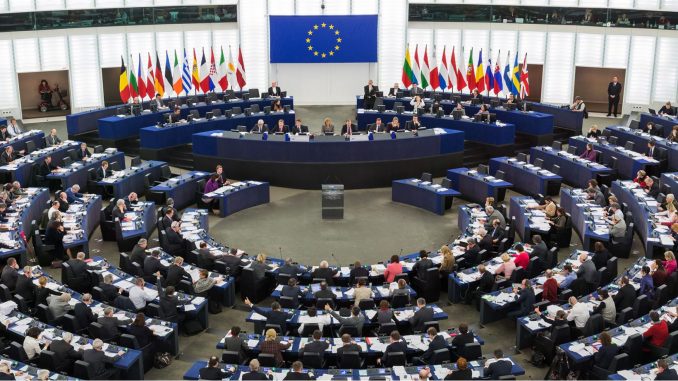The National Union of Somali Journalists (NUSOJ) welcomes today’s historic adoption of a resolution on the situation in Somalia by the European Parliament, as a significant stand against ongoing human rights violations and abuses, particularly endless attacks on journalists’ rights and on media freedom.
The joint resolution was adopted by the European Parliament meeting in Strasbourg to address the situation in Somalia, particularly in light of the looming humanitarian catastrophe that is coming at a time when the political, security and human rights climate in the country continues to deteriorate. The resolution was adopted pursuant to Rule 144 of the Rules of Procedure of the European Parliament.
Today’s resolution condemns all violations and abuses of human rights, especially the attacks on media freedom and freedom of expression, while recognising that “freedom of expression continues to be severely restricted, with journalists and human rights defenders being threatened, arbitrarily detained and denied due process and fair trial guarantees; whereas media outlets have been closed down by the authorities at regional and federal level; whereas the authorities rarely investigate cases of killings or attacks on journalists or prosecute perpetrators”.
The resolution “deplores the recent attacks on journalists and media personnel who have a legitimate role to play in state building and the electoral process, and who should be able to conduct their work without fear or intimidation; calls on the Somali authorities to conduct and conclude investigations into the killings of all journalists during 2021, including that of Jamal Farah Adan, and to bring those responsible to justice”.
Specifically, the European Parliament urged “the Federal Government of Somalia and its Federal Member States to declare, without delay, a moratorium on the arrest and imprisonment of journalists while performing their journalistic duties, as proposed by Reporters Without Borders and the National Union of Somali Journalists, and to put an end to the continued use of Somalia’s old and outdated criminal code to punish journalists and curtail media freedom and freedom of expression”.
While explaining the implication of the resolution to the media freedom situation in Somalia, Omar Faruk Osman, the Secretary General of NUSOJ observed that the Resolution is “unambiguous and truly depicts the worrying situation in the country with regard to human rights violations, restrictions of media freedom and freedom of expression. We are delighted to note that the resolution echoes our concerns relating to the curtailment of freedom of expression and the culture of attacking journalists for speaking truth to power”, remarked Osman.
“This resolution specifically brings to light the recent attacks against journalists and media practitioners who have been targeted while undertaking their legitimate role of informing the Somali public, namely the killings of veteran journalists Jamal Farah Adan and Abdiaziz Mohamud Guled, Director of Radio Mogadishu”, added Osman.
As the ensuing debate on Somalia and the adoption of the resolution perfectly coincided with the International Day to Eliminate Violence against Women, the European Parliament “condemns the ongoing sexual and gender-based violence against women and girls in Somalia, and calls for continued and concerted national efforts to tackle sexual and gender-based violence, including the effective transposition into domestic legislation and application of International Labour Organization (ILO) Convention 190 on violence and harassment in the world of work, which Somalia has ratified, the ratification of the Convention on the Elimination of All Forms of Discrimination against Women and the enactment of progressive legislation against female genital mutilation both at State and Federal levels; urges the Government of Somalia to take concrete measures to prevent sexual violence against women and children”.
Furthermore, the European Parliament expressed concerns about the human and labour rights, and noted that “Somalia remains one of the most dangerous African countries for trade unionists, who are systematically subjected to violence and intimidation; whereas Somali workers are incessantly denied their fundamental human and labour rights, and their occupational health and safety is regularly endangered and poorly paid, including by foreign contractors”.
“For us as journalists and rights advocates in this country, our resolve remains unshaken. We will boldly continue to stand in solidarity with fellow journalists and trade unionists in defence of human and labour rights. We salute the European Parliament for standing with us at this critical time in our history,” Osman added.
The adoption of today’s resolution comes following weeks of advocacy engagements by NUSOJ with members of the European Parliament in which the journalists’ union appealed to the parliamentarians to pay a particular attention to the unfolding human rights situation in the country and take particular actions on the situation.
“Indeed, our consistent advocacy campaign on these same issues, as well as direct engagements with members of the European Parliament is beginning to pay off. I am pleased to note that the campaign we mounted as NUSOJ which engaged members of the European Parliament to shed light on the grave media freedom situation, freedom of expression and labour rights, has in many ways, led to this historic Resolution”, Osman echoed.
Towards that end, NUSOJ calls upon the Somali authorities both at Federal and State levels to get serious and put urgent and practical measures to address the deteriorating media freedom situation, end use of the outdated penal code of Somalia against journalists, declare moratorium on the arrest of journalists and discharge their duties of investigating the violent attacks on journalists.
The adopted Resolution has been forwarded to the EU Council, EU Commission, the Vice President of the EU Commission/High Representative of the Union for Foreign Affairs and Security Policy, the African Union, the President, the Prime Minister and the Parliament of Somalia, the Secretary-General of the United Nations, the United Nations Security Council, the United Nations Human Rights Council, and the ACP-EU Joint Parliamentary Assembly.






